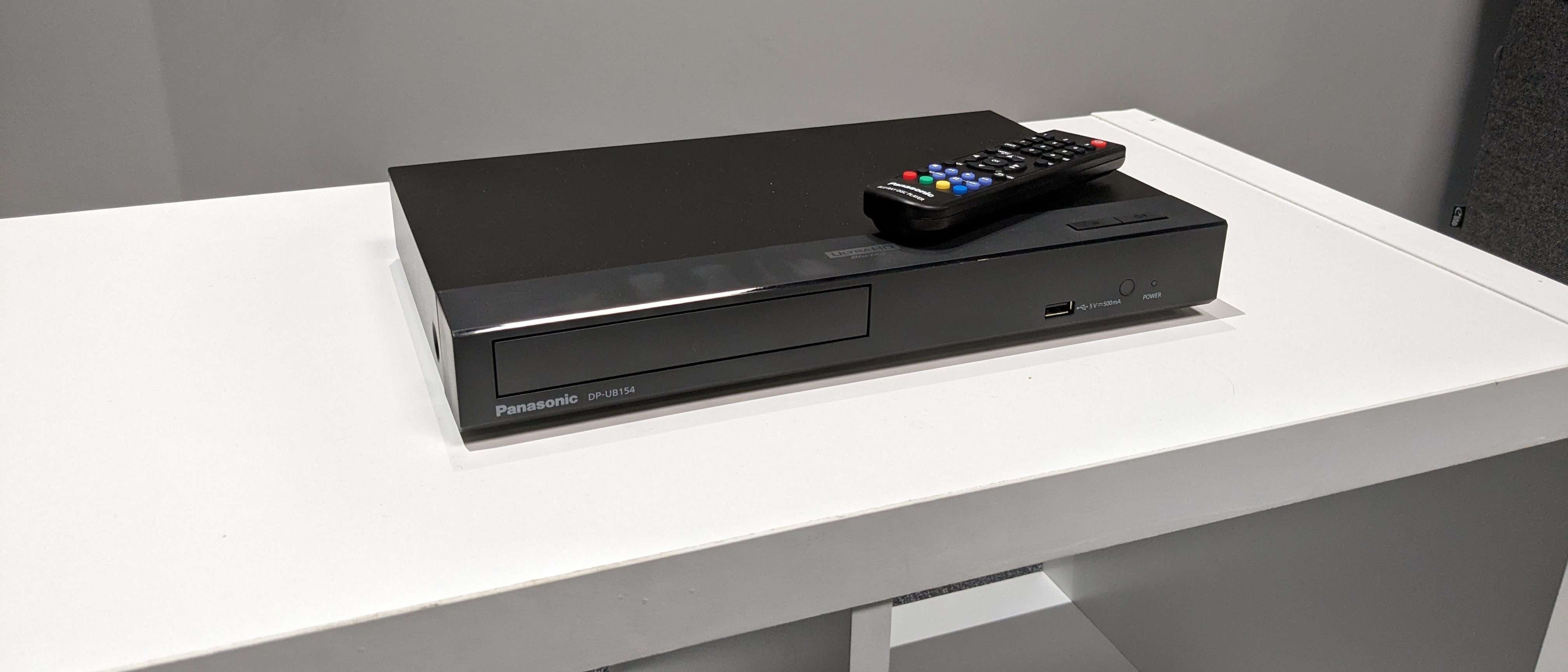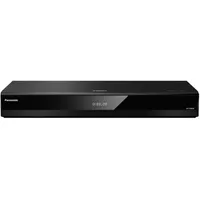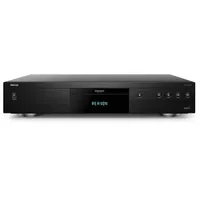TechRadar Verdict
The Panasonic DP-UB154 may not be the most comprehensive 4K Blu-ray player on the market, but what it does it does well. Its 4K picture looks particularly excellent, upscaling is effective and it comes at an extremely competitive price compared to other 4K Blu-ray players with similar specs.
Pros
- +
Excellent picture quality
- +
Budget-friendly price
- +
Upscaling is effective
Cons
- -
Bland design
- -
Can be sluggish at times
- -
No Dolby Vision support
Why you can trust TechRadar
Panasonic DP-UB154: One minute review
The Panasonic DP-UB154 is a 4K Blu-ray player that offers multiple playback options, including 4K and regular Blu-ray, DVD, CD and even hi-res audio for a cheap price. It supports HDR10+ video and the Dolby Atmos and DTS:X audio formats, but there is no Dolby Vision or Wi-Fi for streaming.
Stock and availability does vary from region to region, however. For those who can’t get hold of the DP-UB154, the Panasonic DP-UB150 is almost identical in terms of specs and features so this is a good alternative if you’re struggling to get hold of the UB154.
In terms of picture quality, 4K HDR images look fantastic through the UB154, with excellent detail and contrast. Upscaling is effective across the board for HD Blu-ray and DVD, although DVD can still look fuzzy at times.
The UB154 can also pass-through a wide selection of audio formats, including Dolby Atmos and DTS:X and when played through a Sonos Beam (Gen 2) the soundbar I used for testing, the sound was clear.
Settings and options to adjust picture and audio on the UB154 are much more trimmed down compared to more premium models like the Panasonic DP-UB820, one of the best 4K Blu-ray players, but there is still plenty on offer for those who want to play around. The menus themselves are on the plain and dated side, however, and can be cumbersome to navigate at times.
Design-wise, this is a very simple machine. There is no display for runtimes of media, and the finish is a plain, if not bland black matte. The disc tray can also be slow to respond and feels a little flimsy. However, it still has a fairly solid overall design for the price.
This player is all about doing its main job of displaying discs at an excellent standard, while making sacrifices to features and design. However, if you are after just a simple 4K Blu-ray player, you can't really go wrong as this is one of the best budget players around.
Sign up for breaking news, reviews, opinion, top tech deals, and more.
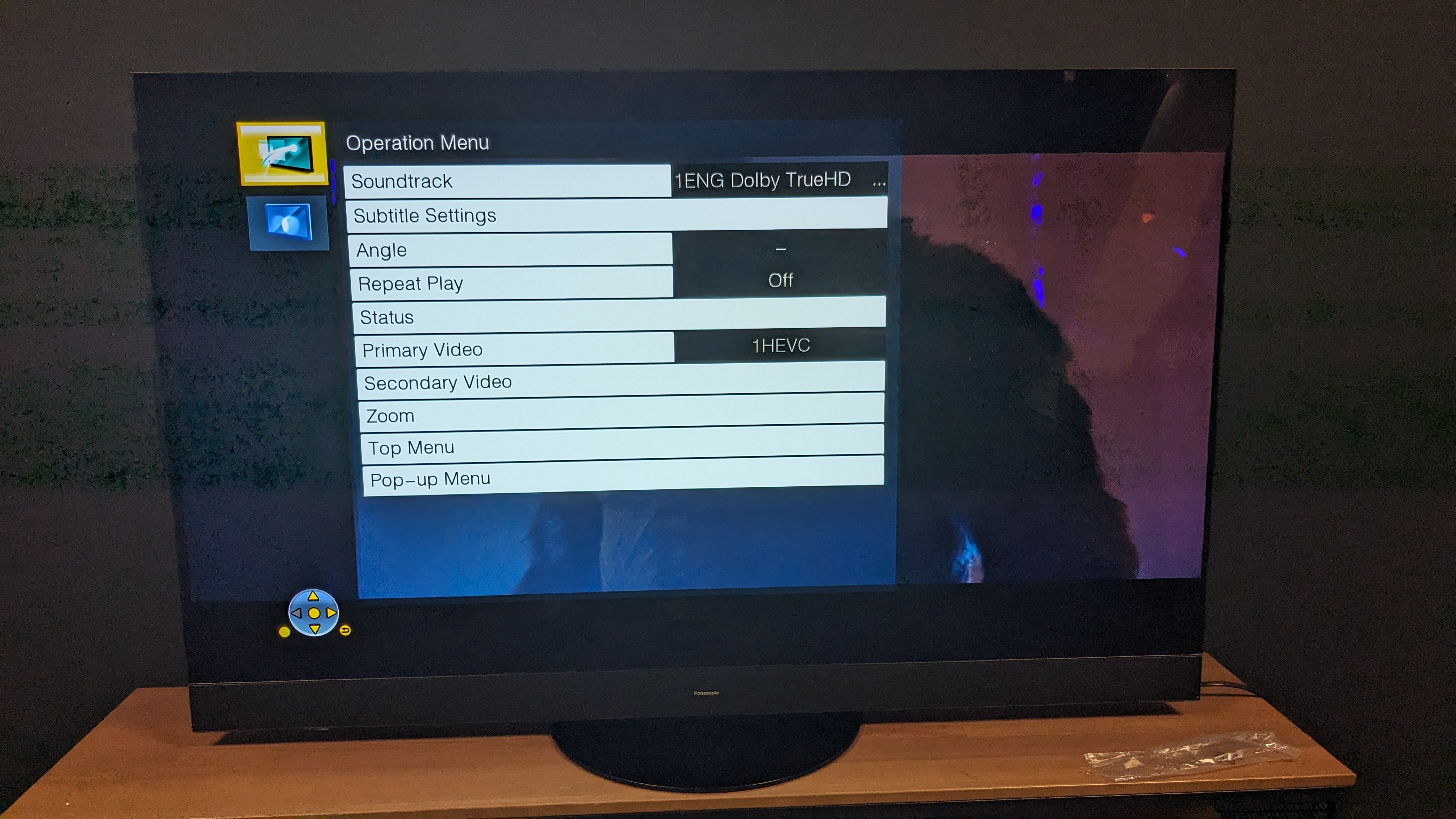
Panasonic DP-UB154 review: Prices & release date
- Release date: February 2019
- Price: £199 / $199 / AU$300 upon release
Released in 2019, the Panasonic DP-UB154 is one of the entry-level 4K Blu-ray players in the company’s lineup. At the time of release, the UB-154 was roughly $199 / £199 / AU$300, although availability in Australia seems scarce compared to the US and UK.
Prices for the UB154 have since been slashed, with it now selling for around $179 / £149 in the US and UK. (Although the price in the UK has fallen as low as £99, which is a bargain for a Blu-ray player of this calibre.)
As I said above, if you’re struggling to get hold of the DP-UB154 in your region, the Panasonic DP-UB150 is almost identical in specs and size and is available for roughly $159 / £159 / AU$275.
Panasonic DP-UB154 review: Specs
| HDR support | HDR10+, HDR10, HLG |
| Audio support | Dolby TrueHD, Dolby Atmos, DTS:X, DTS-HD Master Audio |
| Music support | CD, USB, hi-res audio including ALAC (max 32-bit/192Hz) |
| Connectivity | HDMI output, LAN, USB (2.0) |
| Dimensions | 320 x 46 x 193mm / 12.5 x 1.8 x 7.5 inches |
| Weight | 1.2 kg / 2.6 lbs |
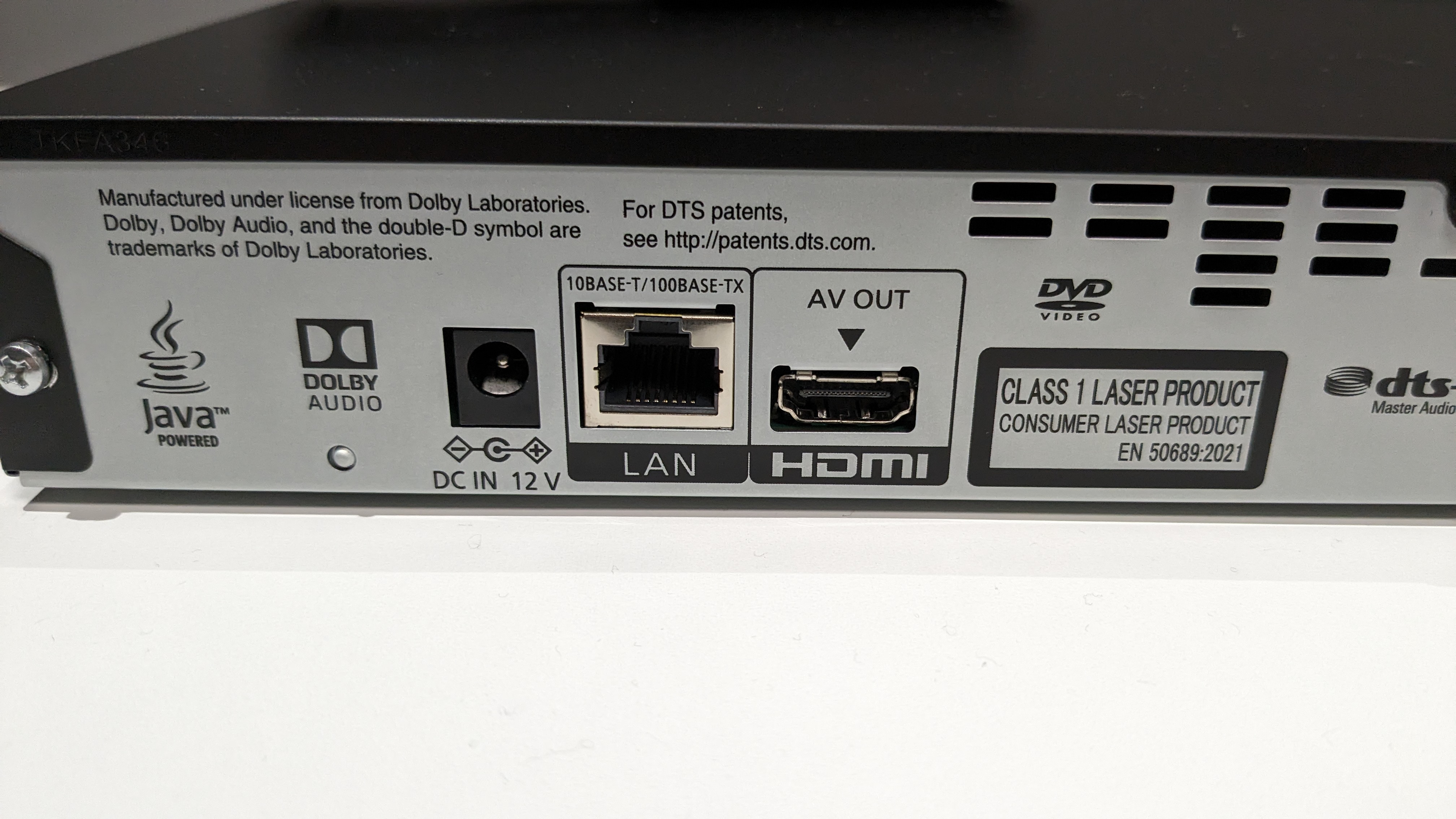
Panasonic DP-UB154 review: Features
- 4K and standard Blu-ray, 3D, DVD playback
- HDR10+ support but no Dolby Vision
- Dolby Atmos, hi-res audio and CD playback
The Panasonic DP-UB154 features plenty of video playback options including 4K, regular and 3D Blu-ray and DVD. For audio playback, it supports hi-res (via USB) and CD. The UB154 doesn’t support SACD discs, so you’ll need to upgrade to the Magnetar UDP800 if that’s what you’re after.
HDR10+, HDR10 and HLG support are onboard, but not Dolby Vision. If you’re looking for a 4K Blu-ray player with Dolby Vision support, you can opt for the more premium Panasonic DP-UB820.
For audio, the UB154 supports Dolby Atmos and DTS:X (both bitstream) and other formats such as Dolby TrueHD and DTS-HD Master Audio (bitstream and decode). For music files, the UB154 can decode FLAC, WAV, ALAC, DSD and AIFF.
Connectivity on the UB154 is more limited compared to the Panasonic DP-UB820. It features a single HDMI output, LAN port (for firmware updates) and a USB input which supports file playback from external drives. There is no Wi-Fi, so you won’t find any streaming apps like Netflix as you would on the UB820.
The simple, stripped-back nature of the UB154 also carries across to its menus and operating system. Whilst the UB154 does offer adjustments, they are noticeably fewer than on the UB820, and limited to settings such as contrast, color and brightness.
The Panasonic UB154 performs well and is easy enough to navigate, but can sometimes be slow to respond. To change some settings, such as turning HDR10+ on and off, involves stopping playback of the disc you’re watching and returning to the settings menu on the homepage. The software within the UB-154 would also stutter and pause at times, but this happened infrequently.
Although the UB154 is light on connectivity and features, it is a 4K Blu-ray player that offers good performance and plenty of playback options at a budget-friendly price.
- Features score: 4/5
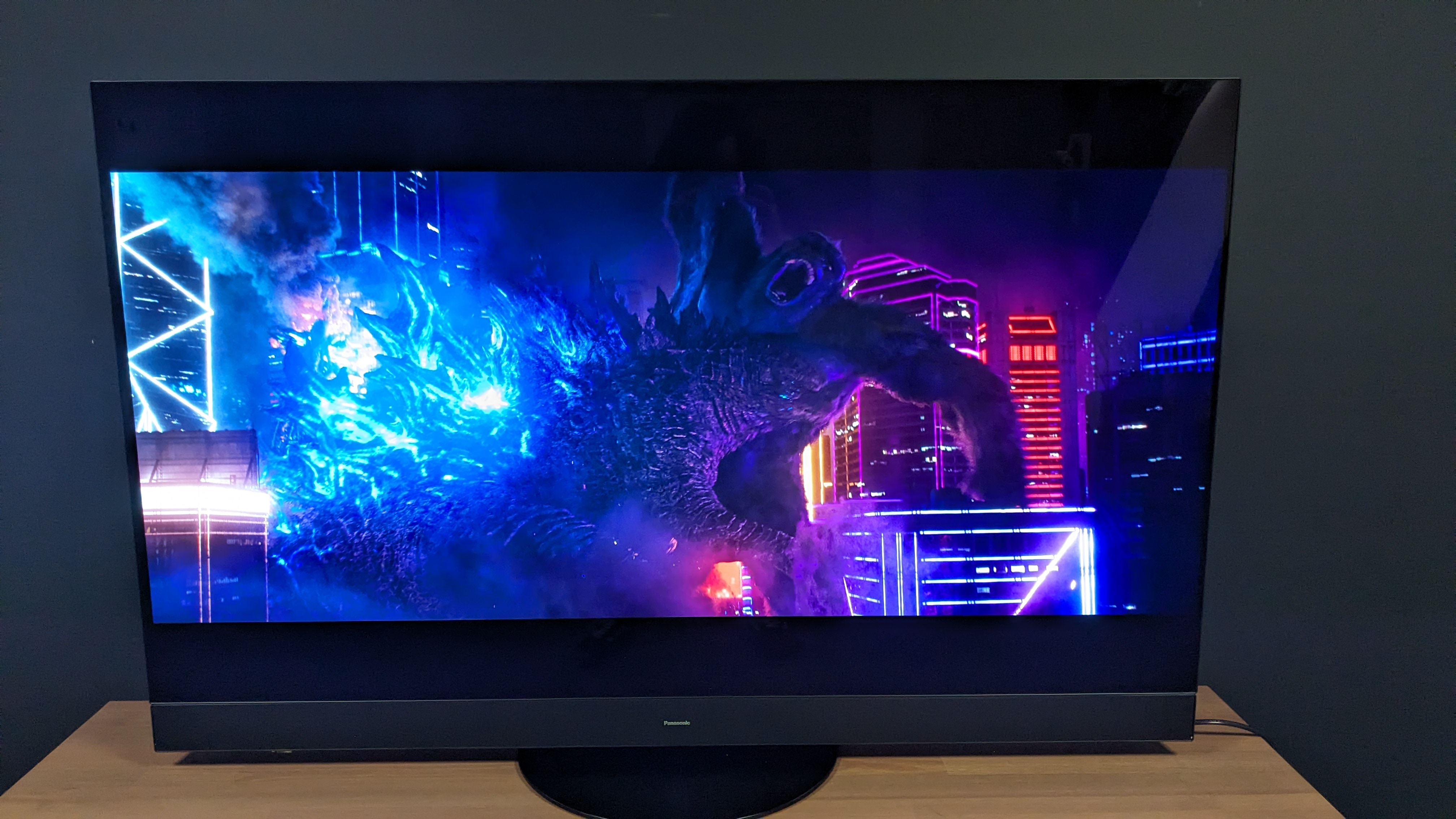
Panasonic DP-UB154 review: Performance
- Brilliant HDR picture
- Effective upscaling of lower-res sources
- Slightly slow loading times
Loading times of the Panasonic UB154 are slower than the more premium UB820, with time from inserting a disc to the first logo appearing taking roughly a minute compared with the UB820’s 30 seconds. This was sometimes marginally quicker, but overall a minute was the norm.
For testing, I used a Panasonic MZ1500 OLED TV as the display with the Filmmaker picture preset mode active.
I first checked out 4K Blu-rays on the UB154 and despite the budget price, pictures looked fantastic. Starting with Godzilla vs Kong, which has HDR10+ high dynamic range, the neon streets of Tokyo were bold, vibrant and as eye-wateringly garish as I hoped during the climactic fight scene between Godzilla and Kong. Contrast was also strong, with the bright lights of the signage balancing with the night sky and dark streets. Textures were incredibly detailed, with the scales on Godzilla coming across as well-defined without being too crisp.
It’s worth noting that in order to get HDR10+ on the UB154, you’ll need a compatible TV. Thankfully, a majority of the Samsung range, including the Samsung S90C, one of the best TVs on the market, support HDR10+. Other TVs that support the format include the Hisense U8K and Philips OLED808.
Textures were also incredibly detailed in Top Gun: Maverick, and the characters’ skin tones looked true-to-life and suitably accurate. Although the 4K Blu-ray of Maverick does not support HDR10+, the picture was nonetheless impressive in the default HDR10 format.
To test 4K upscaling, I used the same scene from Godzilla vs Kong on regular Blu-ray. Played on the UB154, upscaling was effective, and the same dynamic color and brightness punch still jumped from the screen. As expected, textures weren’t as well defined as the 4K version, but the picture was crisp enough to provide an extra level of immersion and depth.
Moving on to DVD, I watched The Amazing Spider-Man. The quality was definitely good, with more vivid colors than I expected and clean textures, although some fuzziness could be seen. Upscaling was not as effective as on the Panasonic UB820, but it still did a very good job.
Using the 4K Blu-ray of Alien and the regular Blu-ray of Thief, I also tested the UB154 to see how it handled older movies with a lot of film grain. With these discs, the UB154 struck a good balance between sharpening and noise reduction whilst also retaining grain for movie enthusiasts. The level of detail rendered and the upscaling was again not as effective as with the more premium UB820, but it was a credible picture nonetheless.
The Panasonic UB154 can pass-through Dolby Atmos, DTS:X, DTS-HD Master Audio and a load of other audio formats. The UB154 was connected to the MZ1500 TV and a Sonos Beam (Gen 2) so I could get the most out of the audio from the 4K discs and in every test, the sound came through the Beam nice and clear.
As a final test, still using the Sonos Beam, I listened to Adele’s ‘Chasing Pavements’ on CD to assess playback quality. Bass and vocals balanced well with each other, with the vocals coming through clean and clear. There was some depth missing when it came to strings and trebles, but for a budget player, CD sound reproduction was decent.
- Performance score: 4.5/5
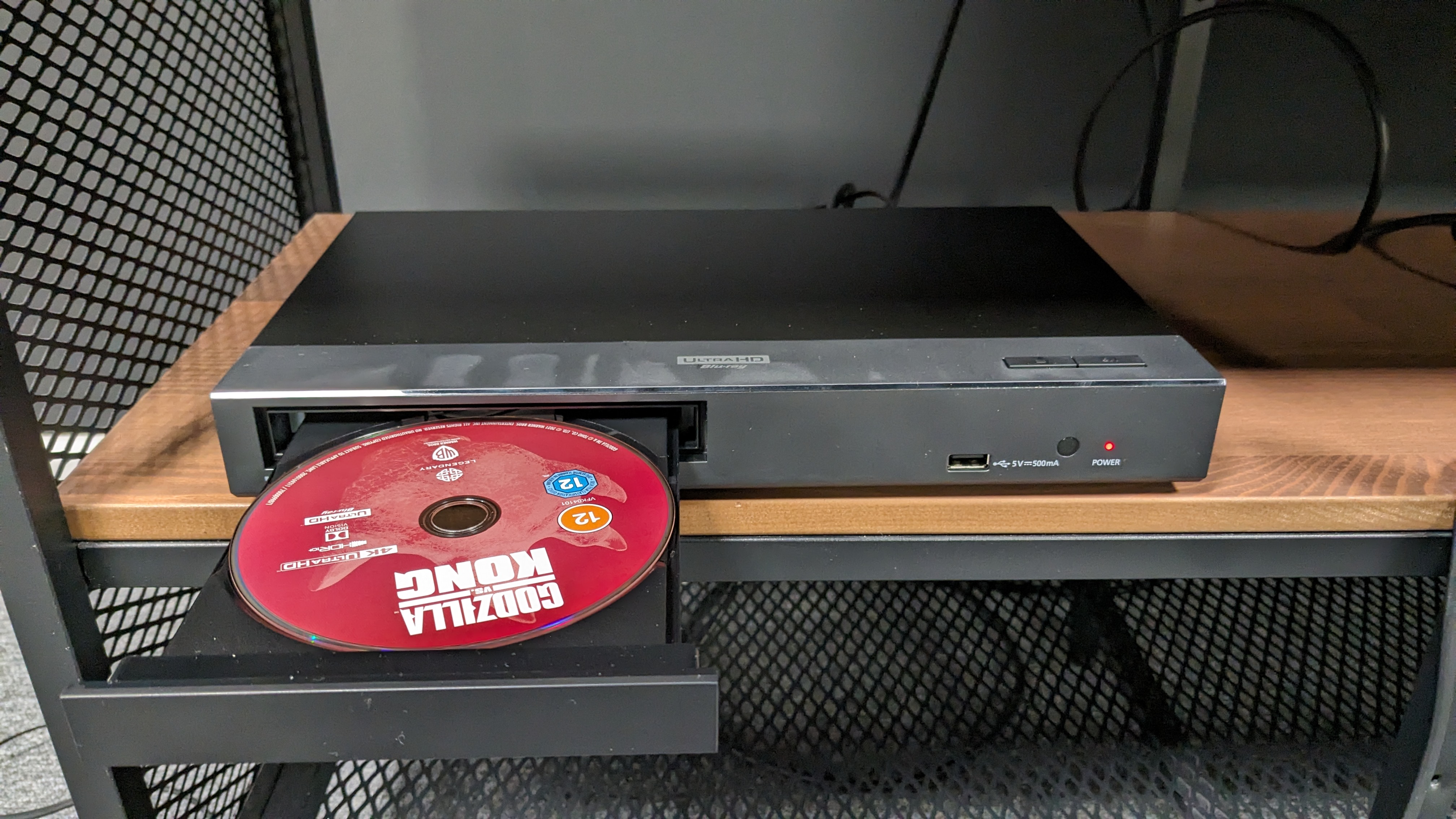
Panasonic DP-UB154 review: Design
- Bland, but solid design for the price
- No display to indicate runtime
- CD tray feels a little clunky at times
Although the Panasonic UB-154 has solid build quality, it’s clear that it is on the budget side, with a matte finish and a bland overall design. It’s also very light, weighing just 1.2kg compared to the UB820’s 2.8kg.
There is no display for a clock or runtime of the disc currently playing on the front, which although not a dealbreaker would have been nice. As for the disc tray itself, there can be a delay between pressing the open command button on the remote and the tray itself opening up, and as such it can feel clunky.
This is a very stripped back and simple Blu-ray player, especially when it comes to what can be found on the rear panel: only a USB port, an HDMI output and a LAN port, as the UB154 doesn’t have Wi-Fi capabilities.
The supplied remote for the UB154 is on the light and small side and cheaply made. Even though the UB154 is a budget player, it would have been nice to see a bit more effort go into the remote
- Design score: 3.5/5
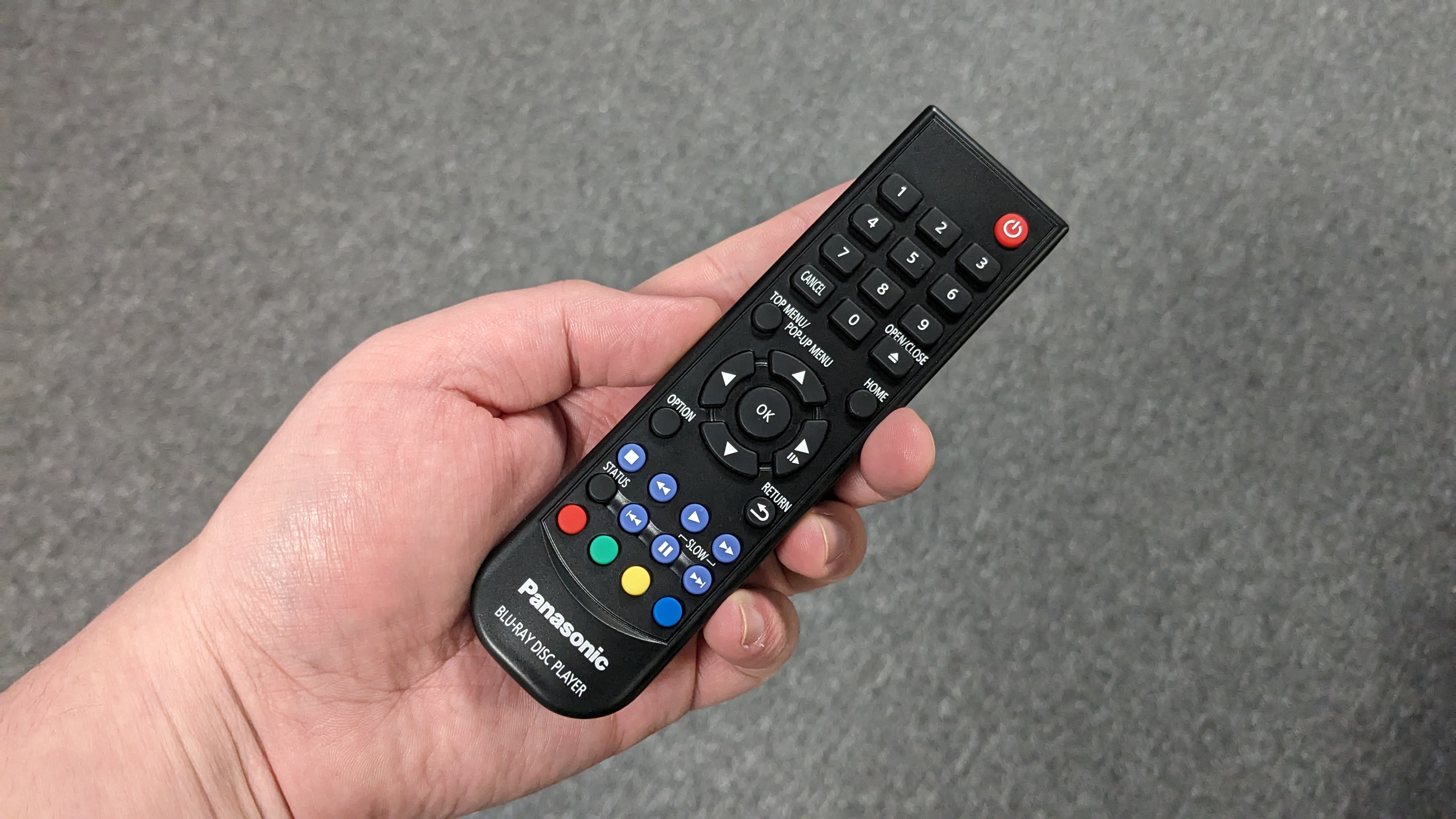
Panasonic DP-UB154 review: Value
- Good features set
- Excellent picture quality for price range
- More design consideration would have been nice
Panasonic’s approach to the UB154 is clearly value for money. It sacrifices on features and design to give you great picture and audio at a budget-friendly price, and for the most part it succeeds.
The fact that the UB154 has dropped as low as $169 / £99 at one stage makes this player nothing short of a bargain. It may not offer the same level of connectivity and features as more premium players, but it does its primary job of playing a range of discs in HDR and SDR formats with great quality.
If you can stretch your budget, the Panasonic DP-UB820 is superior in almost every way, but if you are simply looking for a cheap 4K Blu-ray player, the UB154 is an excellent choice.
- Value score: 4.5/5
Panasonic DP-UB154 review: Should I buy it?
| Features | Not stacked with features but good set for the price | 4/5 |
| Performance | Excellent 4K picture and effective upscaling | 4.5/5 |
| Design | Solid but feels a little cheap and bland in places | 3.5/5 |
| Value | Does its job well and competitively priced for what it offers | 4.5/5 |
Buy it if...
You want an excellent picture
The 4K picture on the Panasonic DP-UB154 really does look superb, with natural textures and stunning contrast.
You have a budget but don't want to compromise
The UB154 may be light on features and connectivity, but for its price, it does the job its given well, even exceeding picture quality expectations.
You watch standard Blu-ray or DVD movies
When watching standard Blu-ray or even DVD, the UB154's upscaling is effective and breathes new life into non-4K discs.
Don't buy it if...
You want a fast Blu-ray player
Load times from inserting disc to start-up and navigating menus can feel clunky and slow at times.
You want Dolby Vision support
The UB154 supports HDR10+ but not Dolby Vision. For that, you'll have to look to other players such as the pricier Panasonic DP-UB820.
Panasonic DP-UB820 review: Also consider
| Row 0 - Cell 0 | Panasonic DP-UB154 | Panasonic DP-UB820 | Sony UBP X700 | Reavon UBR-X100 |
| Price | $199/£149/AU$299 | $499/£349/AU$769 | $239/£219/AU$319 | $799/£799/AU$1,399 |
| HDR support | HDR10, HDR10, HLG | Dolby Vision, HDR10+, HDR10, HLG | Dolby Vision, HDR10, HLG | Dolby Vision, HDR10+, HDR10, HLG |
| Audio support | Dolby TrueHD, Dolby Atmos, DTS:X, DTS-HD Master Audio | Dolby TrueHD, Dolby Atmos, DTS:X, DTS-HD Master Audio | Dolby Atmos, Dolby TrueHD, DTS:X | Dolby Atmos, Dolby TreuHD, DTS:X, DTS-HD Master Audio |
| Connectivity | 1x HDMI, 1x LAN, 1x USB (2.0) | 2x HDMI output (1x Audio, 1x Audio/Video), Digital optical output, Analogue audio LR output, Analogue Audio 7.1 ch output, Wi-Fi, LAN, 2x USB | 2x HDMI, 1x USB, 1x optical output, | 2x HDMI, 2x USB, 1x optical output, 1x coaxial output, |
Panasonic DP-UB820
The DP-UB820 has more features, better picture and more connections than the UB154 and as such is the go-to choice for Blu-ray players. However, it is pricier so should only be an option if you can stretch your budget.
Read our full Panasonic DP-UB820 review
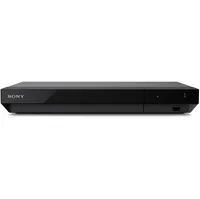
Sony UBPX700
The Sony UBPX700 offers Dolby Vision support where the UB154 doesn't, but not HDR10+ support. It has more connections than the UB154 including optical and Wi-Fi capabilities but comes at a higher price.
Reavon UBR-X100
The Reavon UBR-X100 offers excellent disc playback and 4K upscaling in a rigid and durable design for those looking for a premium 4K player. As a result, you will be paying a lot more money in comparison. Here's our Reavon UBR-X100 review.
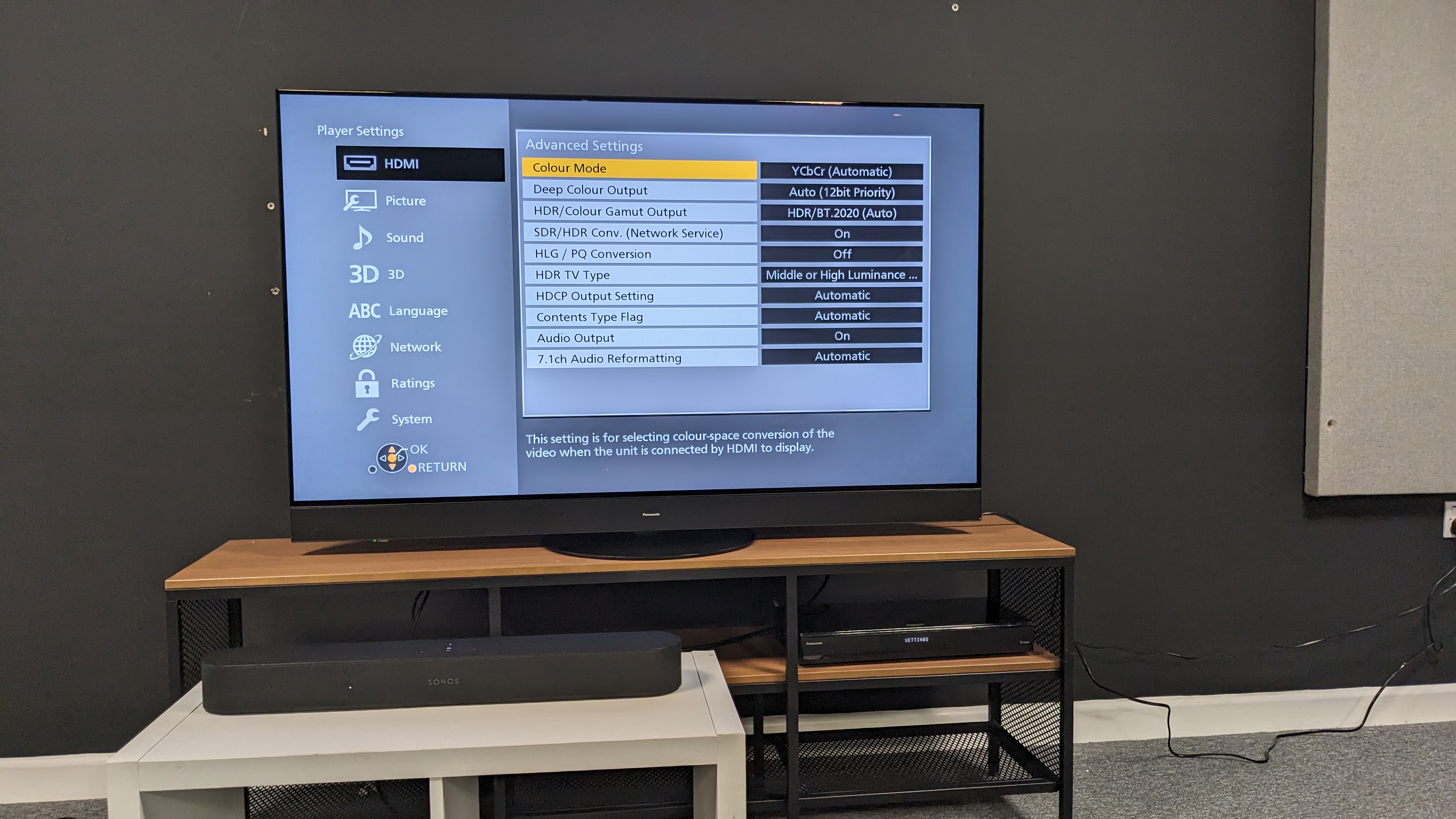
How I tested the Panasonic DP-UB820
- Multiple video sources tested including 4K Blu-ray and DVD
- Tested with Panasonic MZ1500 and Sonos Beam (Gen 2)
- Tested over the course of a couple of weeks
To test the Panasonic DP-UB154, I connected it to the Panasonic MZ1500 OLED and used various sources including 4K Blu-ray, standard Blu-ray, DVD and even CD for audio testing. I watched the same scene across multiple formats in Godzilla vs Kong to test upscaling effectiveness as well.
I also tested the software of the UB154 for ease of navigation, response time and number of settings that can be adjusted.
- First reviewed: January 2024
- Read TechRadar's Reviews Guarantee

James is the TV Hardware Staff Writer at TechRadar. Before joining the team, he worked at a major UK based AV retailer selling TV and audio equipment, where he was either telling customers the difference between OLED and QLED or being wowed by watching a PS5 run on the LG 65G2. When not writing about the latest TV tech, James can be found gaming, reading, watching rugby or coming up with another idea for a novel.
